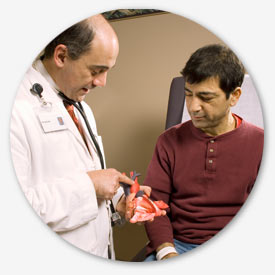Getting quality health care means that you get as much as you need of the right kind of care — care that is safe and effective. The trouble is that sometimes people get care that doesn't work, isn't necessary, or they get no care at all.
Tip 1: Have one doctor (or nurse) who coordinates all your care.
To make sure you get the right amount of the right kind of care, you need one doctor who will watch out for you and coordinate all of your medical care.

If you don't have one doctor who knows about all of the care you're getting, you're more likely to be given care that you don't need or that might be harmful. For example:
- You might get prescriptions from different doctors for drugs that have harmful interactions when they are taken together.
- You're more likely to repeat care, such as a lab test you've already had. This wastes your time and money.
Tip 2: "New" doesn't mean "better"
It's natural to expect that if a drug, test, or treatment is new, it will be better. Sometimes this is true, but sometimes it's not. In some situations, an older test or treatment can be just as effective — or more effective — than a new one. An older test or treatment might also cost less and have a better safety record. Before getting a new treatment or taking a new drug, ask:

- What does medical research say about the side effects and safety of this new drug?
- Why do you think this new treatment would be better for me than what I'm doing now?
Did you know?
To get FDA approval for a new drug, a drug company doesn't have to show that the new drug works better or is safer than drugs that are already in use. It only has to show that the new drug works better than a sugar pill and meets certain safety requirements.
Tip 3: "More" care doesn't mean "better" care
Careful studies of patient care have shown that getting more care does not necessarily mean you are getting better care. In some situations, getting more care can actually be worse for you.

Research by the Dartmouth Atlas Project showed that:
- Patients who got more care didn't do any better or live any longer than those who got less care for the same condition.
- Patients who got more care were less satisfied with their care than patients who got less care for the same condition.
- Patients who got more care also had longer waits and spent more.
Remember that what matters is that you get as much care as you need of care that works well and is safe. You can protect yourself by asking your doctor:
- How is this going to help me?
- What will we find out from this test?
Tip 4: Risks of getting too much care
You might think that it doesn't really matter if you happen to get more care than you need. But getting care you don't need exposes you to unnecessary risks.
Most care involves some kind of tradeoff. Drugs can have side effects. Surgery has risks. X-rays and CT scans expose you to radiation. Tests and treatments can have complications.

Did you know?
The radiation exposure from a single CT scan (also called "CAT scans") can be quite high. For example, radiation exposure from a single CT scan of the chest is about 350 times higher than for an ordinary chest x-ray.
Tip 5: Get a second opinion
When you're facing a major decision about surgery or other treatment, sometimes the best choice isn't clear. After you've seen your usual doctor, it's wise to check with another doctor to get a "second opinion." Many doctors will expect and encourage you to get a second opinion from another doctor.

Did you know?
According to the Congressional Budget Office, 30% of the money spent on health care in the U.S. is for services that may not improve people's health.
Tip 6: Talk with your doctor about the cost of your care
To protect your health, it's important to get as much care as you need. For many people, including those with health insurance, the cost of getting needed care can add up very quickly. If paying for care you need is a problem for you, your doctor needs to know.

There may be ways to cut the cost of your care without sacrificing the quality but your doctor can't help you if he or she doesn't know.
Here are examples of things you can say to your doctor about costs:
- Paying for this test could be a problem for me.
- I wasn't able to fill that last prescription you gave me because the medicine was so expensive.
- I don't know whether my insurance will cover this. Even if it does, I still have to pay my share of the cost.
